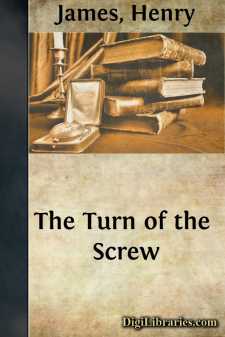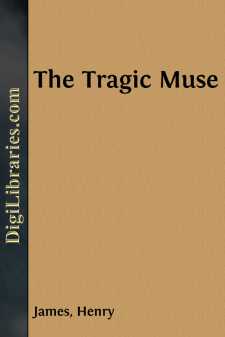Categories
- Antiques & Collectibles 13
- Architecture 36
- Art 48
- Bibles 22
- Biography & Autobiography 813
- Body, Mind & Spirit 142
- Business & Economics 28
- Children's Books 15
- Children's Fiction 12
- Computers 4
- Cooking 94
- Crafts & Hobbies 4
- Drama 346
- Education 46
- Family & Relationships 57
- Fiction 11828
- Games 19
- Gardening 17
- Health & Fitness 34
- History 1377
- House & Home 1
- Humor 147
- Juvenile Fiction 1873
- Juvenile Nonfiction 202
- Language Arts & Disciplines 88
- Law 16
- Literary Collections 686
- Literary Criticism 179
- Mathematics 13
- Medical 41
- Music 40
- Nature 179
- Non-Classifiable 1768
- Performing Arts 7
- Periodicals 1453
- Philosophy 64
- Photography 2
- Poetry 896
- Political Science 203
- Psychology 42
- Reference 154
- Religion 513
- Science 126
- Self-Help 84
- Social Science 81
- Sports & Recreation 34
- Study Aids 3
- Technology & Engineering 59
- Transportation 23
- Travel 463
- True Crime 29
Sort by:
by:
Henry James
A little more than an hour after this he stood in the parlour of Doctor Tarrant's suburban residence, in Monadnoc Place. He had induced a juvenile maid-servant, by an appeal somewhat impassioned, to let the ladies know that he was there; and she had returned, after a long absence, to say that Miss Tarrant would come down to him in a little while. He possessed himself, according to his wont, of the...
more...
by:
Henry James
THE TURN OF THE SCREW The story had held us, round the fire, sufficiently breathless, but except the obvious remark that it was gruesome, as, on Christmas Eve in an old house, a strange tale should essentially be, I remember no comment uttered till somebody happened to say that it was the only case he had met in which such a visitation had fallen on a child. The case, I may mention, was that of an...
more...
by:
Henry James
CHAPTER I On a brilliant day in May, in the year 1868, a gentleman was reclining at his ease on the great circular divan which at that period occupied the centre of the Salon Carre, in the Museum of the Louvre. This commodious ottoman has since been removed, to the extreme regret of all weak-kneed lovers of the fine arts, but the gentleman in question had taken serene possession of its softest spot,...
more...
by:
Henry James
BOOK FIRST. LADY JULIAISave when it happened to rain Vanderbank always walked home, but he usually took a hansom when the rain was moderate and adopted the preference of the philosopher when it was heavy. On this occasion he therefore recognised as the servant opened the door a congruity between the weather and the "four-wheeler" that, in the empty street, under the glazed radiance, waited and...
more...
by:
Henry James
A LONDON LIFE I It was raining, apparently, but she didn't mind—she would put on stout shoes and walk over to Plash. She was restless and so fidgety that it was a pain; there were strange voices that frightened her—they threw out the ugliest intimations—in the empty rooms at home. She would see old Mrs. Berrington, whom she liked because she was so simple, and old Lady Davenant, who was...
more...
by:
Henry James
"NO, my lord," Banks had replied, "no stranger has yet arrived. But I'll see if any one has come in—or who has." As he spoke, however, he observed Lady Sandgate's approach to the hall by the entrance giving upon the great terrace, and addressed her on her passing the threshold. "Lord John, my lady." With which, his duty majestically performed, he retired to the...
more...
by:
Henry James
I profess a certain vagueness of remembrance in respect to the origin and growth of The Tragic Muse, which appeared in the Atlantic Monthly again, beginning January 1889 and running on, inordinately, several months beyond its proper twelve. If it be ever of interest and profit to put one's finger on the productive germ of a work of art, and if in fact a lucid account of any such work involves that...
more...
by:
Henry James
FROM MISS MIRANDA MOPE, IN PARIS, TO MRS. ABRAHAM C. MOPE, AT BANGOR, MAINE. September 5th, 1879. My dear mother—I have kept you posted as far as Tuesday week last, and, although my letter will not have reached you yet, I will begin another before my news accumulates too much. I am glad you show my letters round in the family, for I like them all to know what I am doing, and I can’t write to...
more...
by:
Henry James
I had done a few things and earned a few pence—I had perhaps even had time to begin to think I was finer than was perceived by the patronising; but when I take the little measure of my course (a fidgety habit, for it's none of the longest yet) I count my real start from the evening George Corvick, breathless and worried, came in to ask me a service. He had done more things than I, and earned...
more...
by:
Henry James
The first one took place in the country, at a little tea-party, one snowy night. It must have been some seventeen years ago. My friend Latouche, going to spend Christmas with his mother, had persuaded me to go with him, and the good lady had given in our honor the entertainment of which I speak. To me it was really entertaining; I had never been in the depths of New England at that season. It had been...
more...











